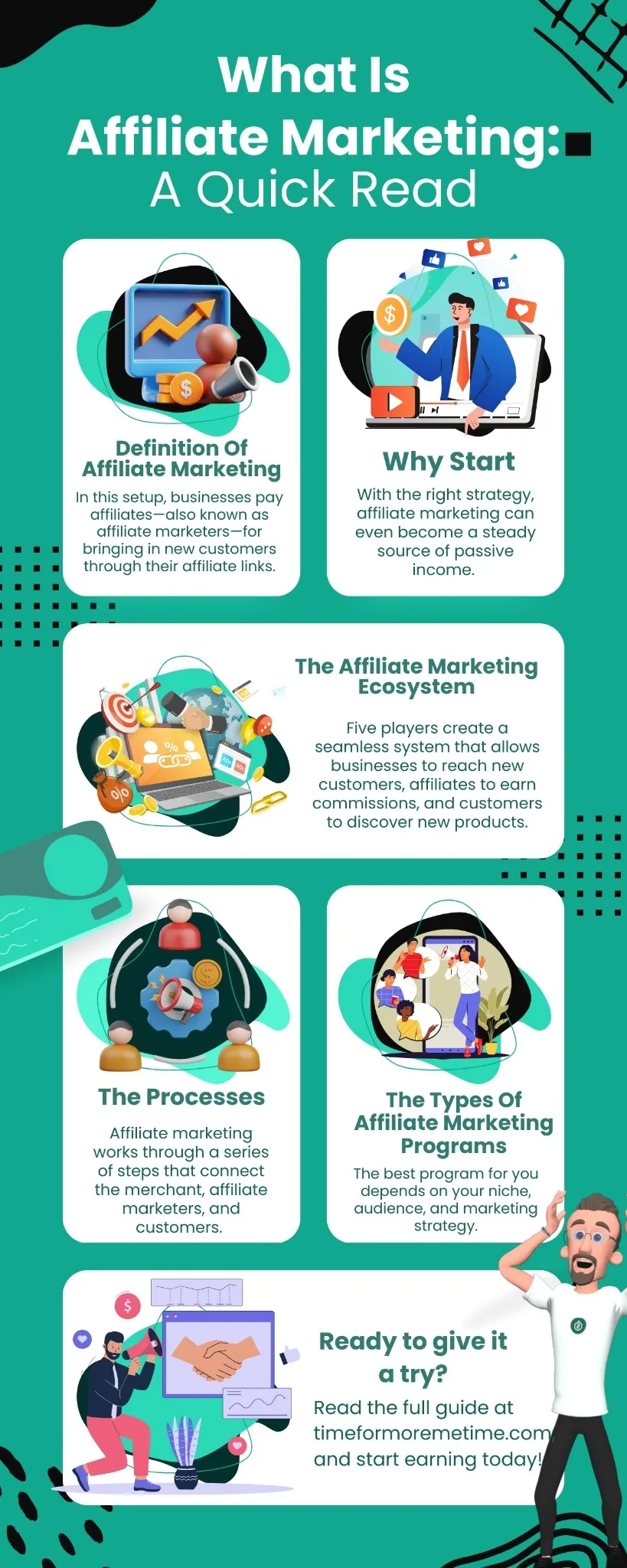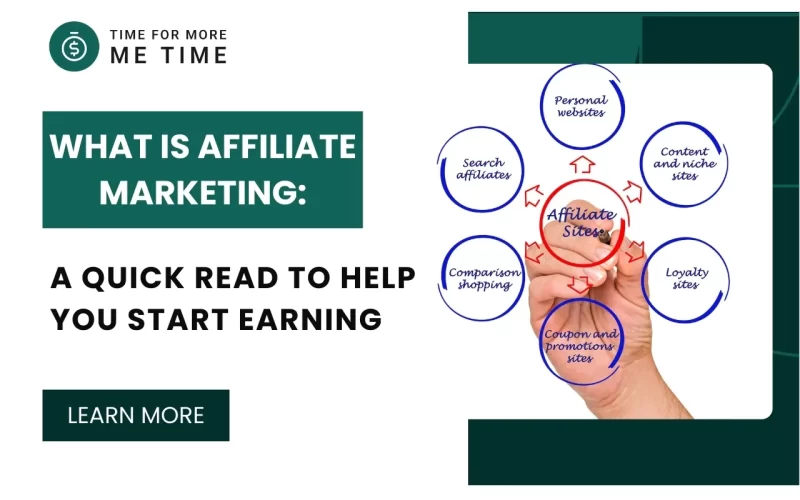
Curious about affiliate marketing and how it works? You’re in good company. Affiliate marketing has become one of the most popular ways for individuals and businesses to earn money online.
But what exactly is it, and why has it become such a game-changer?
In simple terms, affiliate marketing is a performance-based strategy where you earn a commission by promoting someone else’s products or services.
When someone clicks your unique affiliate link and makes a purchase, you get paid. It’s a win-win: businesses expand their reach, and affiliates earn rewards for driving sales.
At first glance, it might sound straightforward—and in many ways, it is. But success in affiliate marketing requires more than just sharing links.
You’ll need a clear plan, the right products to promote, and a commitment to providing value to your audience.
The beauty of affiliate marketing is its flexibility. Whether you’re a blogger, a social media influencer, or just someone with a knack for connecting people to solutions, affiliate marketing can work for you.
With the right approach, what starts as a simple side hustle can grow into a substantial income stream.
Ready to dive deeper and learn how to get started? Let’s explore the essentials of affiliate marketing and uncover the strategies that lead to success.
The Definition Of Affiliate Marketing

Affiliate marketing is a straightforward type of performance-based marketing. In this setup, businesses pay affiliates—also known as affiliate marketers—for bringing in new customers through their affiliate links.
Here’s how it works: as an affiliate marketer, you promote a company’s products or services. When someone clicks your unique affiliate link and makes a purchase, you earn a commission. It’s as simple as that.
The Reasons To Start Affiliate Marketing
Affiliate marketing is a low-risk, high-reward way to make money online. You don’t need to create your own products, handle customer service, or worry about shipping and fulfillment.
With the right strategy, affiliate marketing can even become a steady source of passive income. A single blog post or YouTube video can continue earning affiliate commissions for months or even years after it’s published.
That said, success in affiliate marketing doesn’t happen overnight. It requires more than just a little time and effort—you need to stay curious, keep learning, and adapt to changes. If you’re passionate about your niche and focused on genuinely helping your audience, affiliate revenue is well within reach.
Whether you’re a blogger, YouTuber, or social media influencer, affiliate marketing is worth a try. With persistence and a solid plan, you could find yourself enjoying the flexibility and freedom of the laptop lifestyle you’ve always dreamed of.
At its heart, affiliate marketing is simple: you share great products or services with others, and when they make a purchase through your recommendation, you earn a commission.
It’s a win-win for everyone. Businesses get sales, affiliate marketers make money, and customers find what they’re looking for. While it may take some time and effort to build momentum, the potential for consistent passive income makes it well worth the investment.
The Affiliate Marketing Ecosystem

In affiliate marketing, five significant players keep everything running smoothly:
- The merchant: Also called the creator or seller, is the business or individual who owns the product or service being sold. They create the product, set the pricing, and decide on commission rates for affiliates who promote their items.
- The network: A platform or affiliate network where affiliates can find offers to promote. The affiliate network acts as a middleman between merchants and affiliates. It hosts offers from various merchants, providing affiliates with a variety of products or services they can choose to promote. Networks also handle tracking, payments, and other technical aspects.
- The publisher: Also known as the publisher. This is you, the person who promotes the merchant’s products or services. Affiliates create content—whether it’s through blogs, social media, videos, or email—and share their affiliate links with their audience. When someone clicks on the link and makes a purchase, the affiliate earns a commission.
- The customer: The customer is the end user who clicks on the affiliate link and makes a purchase. They benefit by finding a product or service that suits their needs, and they may also benefit from discounts or special offers if the affiliate provides them.
- The Affiliate Program Manager: This person or team within the merchant’s business oversees the affiliate program. They handle tasks like recruiting new affiliates, managing commissions, providing promotional materials, and ensuring affiliates have the support they need to succeed. The program manager helps ensure the partnership between merchants and affiliates runs smoothly. Often, you’ll not get to interact with them.
Together, these five players create a seamless system that allows businesses to reach new customers, affiliates to earn commissions, and customers to discover new products—all while maintaining transparency and fair rewards for everyone involved. It’s a simple yet powerful ecosystem that, when done right, can lead to long-term success for all parties.
The Processes In Affiliate Marketing

Affiliate marketing works through a series of steps that connect the merchant, affiliate marketers, and customers. Here’s a detailed breakdown of how it all comes together:
- The Merchant Creates a Product or Service: The merchant, or business owner, develops a product or service to offer to customers. This could be anything from physical goods to digital products or services. The merchant sets the price, determines the features, and establishes the terms for commissions, usually offering affiliates a percentage of the sale price.
- The Merchant Registers with an Affiliate Program: Once the merchant has their product or service ready, they register with an affiliate program or network. This could be an established affiliate network (like ShareASale or Amazon Associates) or a private affiliate program managed by the merchant directly. In this program, the merchant lists all the important details about their products, including commission rates, payment terms, and any marketing materials affiliates can use.
- The Affiliate Marketer Chooses an Offer to Promote: The affiliate marketer reviews the available products or services in the affiliate program and selects one that aligns with their audience’s interests. Once the affiliate selects an offer, they are given a unique affiliate link to track their sales and commissions. This link will include a special code that identifies the affiliate as the source of the sale.
- The Affiliate Shares the Link: The affiliate marketer now promotes the product by sharing the unique affiliate link across various channels. These can include a blog post, social media platforms, email newsletters, YouTube videos, podcasts, or other marketing outlets. The goal is to reach a broad audience and encourage them to click the link to learn more about the product or make a purchase.
- The Customer Clicks the Affiliate Link and Makes a Purchase: When a customer sees the affiliate’s promotion, they click the affiliate link, which takes them to the merchant’s website or landing page. If the customer decides to make a purchase, the sale is tracked by the affiliate network or program. The affiliate link ensures that the merchant knows the sale came from the affiliate marketer’s promotion.
- The Affiliate Network Tracks the Sale: The affiliate network plays a vital role in tracking all transactions. They monitor when a customer clicks the affiliate link, tracks the sale, and ensures the affiliate marketer is credited for the transaction. The network makes sure that the affiliate marketer gets their rightful commission by verifying the sale and payment details.
- Affiliate Marketers Receive Payments: Once the sale is confirmed and processed, the affiliate network pays the affiliate marketer the agreed-upon commission. Payment schedules and methods vary depending on the network or affiliate program, but typically affiliates receive their earnings monthly, bi-weekly, or after reaching a certain payment threshold. Some programs also offer recurring commissions if the product is a subscription-based service.
This system benefits all parties. By partnering with affiliate marketers, merchants can expand their reach and generate more sales without directly managing marketing campaigns. Affiliates help increase visibility and drive traffic to the merchant’s site, resulting in higher sales.
Meanwhile, affiliates earn commissions for promoting products they believe in. They don’t have to handle product creation, customer service, or shipping, making it a relatively low-risk way to generate income. With consistent effort, affiliate marketing can become a reliable source of passive income.
Lastly, customers benefit by discovering valuable products or services that meet their needs. They also may gain access to discounts or exclusive deals through the affiliate’s promotions.
The Types Of Affiliate Marketing Programs
There are several types of affiliate marketing programs, each with its own advantages and disadvantages. Here are a few of the most common:
- Pay-Per-Sale (PPS): This is the most common model. Affiliates earn a commission for each successful sale they generate.
- Pay-Per-Lead (PPL): Affiliates earn a commission for each lead they generate, such as email sign-ups, contact form submissions, or free trials.
- Pay-Per-Click (PPC): Affiliates earn a commission for each click on an affiliate link. This model is less common than PPS and PPL.
- Pay-Per-Impression (PPI): Affiliates earn a commission for each time an ad is displayed on their website or social media channels. This model is also less common than PPS and PPL.
- Recurring Commission Programs: Affiliates earn a recurring commission for each customer they refer who continues to make purchases from the merchant.
I prefer the pay-per-sale model because it’s straightforward and offers the potential for the highest earnings. However, the best program for you depends on your niche, audience, and marketing strategy.
Conclusion
Affiliate marketing is a simple yet powerful way to earn money online by promoting products or services and earning commissions for each sale or lead you generate. It’s a low-risk, high-reward opportunity that doesn’t require you to create your own products or handle customer service.
While it may take time to build momentum, the potential for passive income makes affiliate marketing worth considering. With the right approach, you can turn it into a steady income stream, whether you’re a blogger, social media influencer, or content creator.
Ready to give it a try? Affiliate marketing offers a straightforward way to start earning from your content and recommendations.
Anyway, if you’re too busy to read, you might want to watch content from us instead. Follow us on YouTube and our social media pages for more insights, updates, and resources to help you achieve financial freedom.






